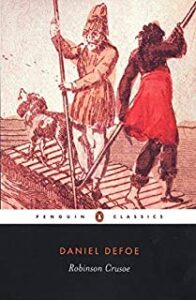Robinson Crusoe by Daniel Defoe 1719
Though nearly every child in 2021 knows the names of Robinson Crusoe and Friday, I had managed to reach my old age without ever reading this classic tale of shipwreck, isolation, and self-preservation written over 400 years ago.
It’s quite a tale, densely packed into more than 250 pages filled with precise and sometimes boring descriptions of Crusoe’s unnamed and uncharted island home, details of his daily life, some exciting fight scenes and a happy ending all conveyed in the format of a journal via a first-person narrative. The book starts with Crusoe’s birth in 1632 in York, England, the third son of an ‘ancient’ German father. a merchant who had married a Robinson and moved to England. With few prospects, Crusoe turned to the sea for adventure but found nothing but trouble—shipwrecks, terrible storms, slavery in Africa after being captured by pirates—until he was taken under the wing of a kind Portuguese ship captain. With the captain’s help, he set sail for Brazil where he established a successful sugar cane plantation. During a voyage from Brazil to the Caribbean, a fierce storm destroyed the ship, drowned all of his shipmates, and left him miraculously stranded on an uninhabited island where he spent the next 28years, two months and 19 days. Friday arrived some 24 years into Crusoe’s isolation, a native Carib who was brought to the island by his foes who had captured him in a war and were intending to eat him. Crusoe saved his life, and Friday became his grateful and loyal servant, learning English and the skills needed to survive on the island. They lived in relative contentment in quarters built from scratch by Crusoe, eating corn and wheat he planted, and drinking milk from goats he had domesticated until their lives were threatened by the arrival first of cannibals from the mainland and then by an English ship which had experienced a mutiny.
Crusoe and Friday eventually emerge as victorious and sail back to Lisbon where Crusoe regains his property and a sizable fortune before returning to England where he marries, has children, and embarks on another adventure, “All these things, with some very surprising incidents in some new adventures of my own, for ten years more, I may perhaps give a farther account of hereafter” are the book’s final lines.
Defoe’s novel can be read in many ways—a straight adventure story, a religious proselytizing tract, a book about the civilizing impact of Europeans on native populations, a self-help book, a racist screed—but it’s perhaps best to just sit back and go with the flow, enjoying a book written very long ago and still enjoyable today.



